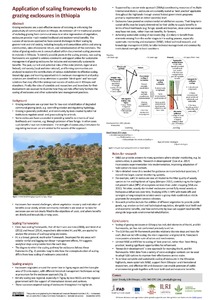Resource information
Grazing exclosures are a cost-effective means of restoring or enhancing the productivity of communal lands in Ethiopia. An extension of the traditional practice of excluding grazing from communal areas to enable regeneration of vegetation, exclosures provide much needed livelihood and environmental benefits. The success of the exclosure approach faces several challenges to their scaling by government and civil society, including inequity and competition within and among communities, rates of economic return, and individualisation of the commons. First, success factors in exclosure management are identified for exclosures in general, as well as along gradients in social (e.g., strength of community institutions, market access, and cultural precedents), ecological (e.g., climate and soils), and socio-ecological conditions (e.g., watershed and agricultural development stages). The status of grazing exclosures is then conceptualised within documented scaling processes in drylands in Ethiopia and elsewhere. Next, to identify possible pivots in the scaling process, two scaling frameworks are applied to address constraints and opportunities for sustainable management of grazing exclosures for inclusive and economically sustainable benefits. These frameworks include consideration of up-scaling (vertical or hierarchical) versus out-scaling (horizontal) approaches to expansion of exclosures. The past, current, and potential roles of the state (district, regional, and federal government), civil society (local and international organisations), and farming communities are analysed to explore the contributions of various stakeholders to effective scaling. Knowledge gaps and learning opportunities in exclosure management and policy solutions are identified to draw attention to possible ‘blind-spots' and ‘win-win' solutions that may affect the widespread success of exclosures in Ethiopia and elsewhere. Finally, the roles of scientists and researchers and incentives for their involvement are assessed to illustrate how scientists can help effectively facilitate the scaling of exclosures and other sustainable land management practices.



